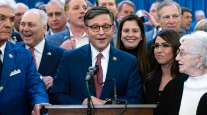Senior Reporter
Policymakers Keep Autonomous Vehicles Bill on Senate’s Radar

[Stay on top of transportation news: Get TTNews in your inbox.]
Two of the key drivers of autonomous vehicle policy in Congress again touted its potential safety and economic benefits during a hearing with stakeholders.
Sens. Gary Peters (D-Mich.) and John Thune (R-S.D.), authors of the most recent legislation pertaining to autonomous vehicles, stressed that the technology could reshape the country’s mobility landscape, boost myriad sectors of the economy, transform access to freight and passenger corridors and assist individuals lacking transportation opportunities.
“One of the most important opportunities we can seize is autonomous vehicle technologies,” said Peters on April 27 during a hearing of the Surface Transportation, Maritime, Freight and Ports Subcommittee.

Thune participates in hearing remotely. (commerce.senate.gov)
“We know that autonomous vehicles save lives, since 90% of accidents are caused by human error. We know that these technologies are also rapidly emerging and are already impacting the workforce. And we know that our competitors on a global stage, especially China, are recognizing the benefits of these technologies. And let’s be clear, let’s be absolutely clear, these technologies are coming inevitably.”
Thune addressed the benefits access to autonomous vehicles would have on individuals with disabilities and the elderly population, especially in rural communities. He also pointed to safety features.

The year is 2039. Zero-emission, electric heavy-duty trucks roll past you on the highway. Charging ports are now commonplace at terminals and truck stops. Diesel-powered vehicles are becoming a thing of the past. You sit and wonder: How did we get here? Here, in 2021, Daimler Trucks North America's head of eMobility speaks to RoadSigns. Hear a snippet above, and get the full program by going to RoadSigns.TTNews.com.
“It has potential to greatly reduce the average of more than 40,000 traffic fatalities on our nation’s roadways each year,” said Thune. “The United States’ regulatory framework has got to catch up with private sector innovation, in order for these technologies to advance.”
The senators intend to continue seeking support for autonomous vehicles legislation during this session of Congress. In the coming weeks, the transportation committees in Congress plan to consider comprehensive highway policy legislation.
In recent years, the Commerce Committee, which oversees trucking policy, has signaled interest in developing comprehensive legislation on autonomous technology meant to facilitate mobility options. During previous sessions of Congress, Thune and Peters co-sponsored legislation designed to establish a federal framework for the technology. Their counterparts in the U.S. House of Representatives crafted legislation that would establish guidelines for the technology’s deployment. Neither version reached the president’s desk for enactment.
Meanwhile, transportation stakeholders continue to urge lawmakers to pursue policies meant to expand safety features and economic incentives. John Bozzella, president and CEO of Alliance for Automotive Innovation, argued that a “coherent, national approach to automotive innovation opens the door to endless possibilities and avoids the unintended consequences of focusing on narrow policy objectives.”

John Bozzella, CEO of Alliance for Automotive Innovation, discusses the state of automotive innovation. (commerce.senate.gov)
He went on, “The auto industry has long been an economic engine for the nation, and it is poised to remain the bedrock of U.S. innovation and manufacturing for decades to come. Realizing this potential, however, requires collaboration, cooperation and creativity among all stakeholders. This is an opportunity to open our minds to new possibilities and work together to take a fresh, comprehensive look at what it will take to realize a shared vision of a cleaner, safer, smarter future.”
“For the U.S. to remain a leader in innovative technological advancements, we require a competitive environment with access to skilled and educated workers, raw materials, financing and transportation logistics,” added Ann Wilson, senior vice president of the Motor and Equipment Manufacturers Association. “Suppliers rely on legislative and regulatory certainty to achieve steady progress toward sustainable objectives. Policies must be in place for the U.S. to continue leading in the race to develop and manufacture these innovations domestically or our nation’s manufacturing and employment bases will ultimately suffer.”
Want more news? Listen to today's daily briefing below or go here for more info:




